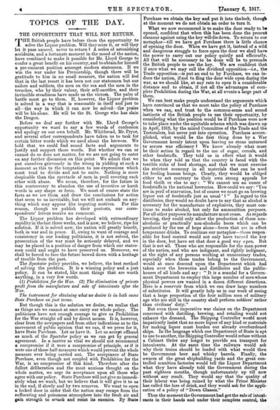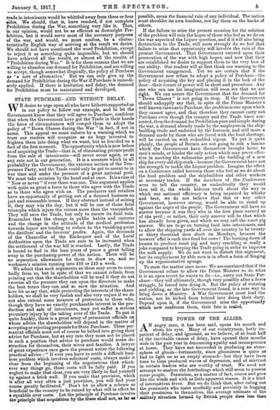TOPICS OF THE DAY.
THE OPPORTUNITY THAT WILL NOT RETURN. THE British people have before them the opportunity to solve the Liquor problem. Will they seize it, or will they let it pass unused, never to return A series of astonishing accidents, and a fortunate moment in the mood of the nation, have combined to make it possible for Mr. Lloyd George to confer a great benefit on his country, and to obtain for himself a pre-eminent position amongst modern statesmen. If we win the war under his Premiership, though there will be gratitude to him in no small measure, the nation will feel that in the last resort it has been not our statesmen but our sailors and soldiers, the men on the sea and the men in the trenches, who by their valour, their self-sacrifice, and their invincible steadiness have made us the victors. The palm of battle must go to them. If, however, the Liquor problem is solved in a way that is reasonable in itself and just to all—the way in which it can now bo solved—the praise will be his alone. He will be the St. George who has slain the Dragon.
Before we deal any further with Mr. Lloyd George's opportunity we want to say a few words of confession and apology on our own behalf. Mr. Whitbread, Mr. Pryor, and several other correspondents have taken us to task for certain bitter words which we used about the brewers. We hold that we could find sound facts and arguments to justify and support those words. But whether we can or cannot do so does not matter, for we are not going to enter on any further discussion on this point We admit that we put ourselves grievously in the wrong in yielding at such a moment as this to the temptation to use expressions which must tend to divide and not to unite. Nothing is more despicable than the spectacle of men in peril covering each other with abuse. We mean, therefore, for the future in this controversy to abandon the use of invective or harsh words in any shape or form. We must of course state the facts as we see them and draw the conclusions for action that seem to us inevitable, but we will not embark on any- thing which may appear like imputing motives. For this reason, though we publish their protests, our corre- spondents' letters receive no comment.
The Liquor problem has developed with extraordinary rapidity in the last three weeks, and is now, we believe, ripe for solution. If it is solved now, the nation will greatly benefit, both in war and in peace. If, owing to want of courage and consistency in our leading politicians, it is not solved, the prosecution of the war must be seriously delayed, and we may be placed in a position of danger from which our states- men could and ought to have preserved us. Moreover, we shall be forced to face the future bowed down with a heritage of trouble from the past.
The Spectator policy provides, we believe, the best method of solving the problem. It is a winning policy and a just policy. It can be stated, like most things that are worth anything, in a very few words.
(1) Prohibition for the War. (2) The elimination of private profit from the manufacture and sale of intoxicants after the ar. The instrument for obtaining what we desire is in both cases State Purchase on just terms.
But though this is the solution we desire, we realize that as things are we cannot at once carry our whole policy. The politicians have not enough courage to give us Prohibition for the War straight off and by direct means. It is, however, clear from the newpapers and from other indications as to the movement of public opinion that we can, if we press for it, have State Purchase. Let us have it. Let us accept offhand as much of the Spectator policy as we can get by general agreement. In a matter so vital we should not recommend a compromise if it were a compromise of principle, or if it were one of those half-measures which would prevent the whole measure ever being carried out. The acceptance of State Purchase, even though not coupled with Prohibition for the War, is no compromise of this kind. Therefore after the fullest deliberation and the most anxious thought on the whole matter, we urge its acceptance upon all those who agree with our policy. State Purchase will not give us immedi- ately what we want, but we believe that it will give it to us in the end, if slowly and by two removes. We want to open a locked door in Order that the nation may escape from the suffocating and poisonous atmosphere into the fresh air and pin strength to attack and resist its enemies. By State Purchase we obtain the key and put it into the lock, though at the moment we do not obtain an order to turn it.
What we now recommend is to make the door ready to he opened, confident that when this has been done the present clamour against using the key will die down. To return to our metaphor—till we have got Purchase there is little chance of opening the door. When we have got it, instead of a wild and dangerous struggle to force open the door we shall have the power to carry out our policy quietly and efficiently. All that will be necessary to be done will be to persuade the British people to use the key. We are confident that if once what we may call the dividend opposition—i.e., the Trade opposition—is put an end to by Purchase, we can in- duce the nation, if not to fling the door wide open during the war, as we should like, at any rate to open it a considerable distance and to obtain, if not all the advantages of com- plete Prohibition during the War, at all events a large part of them.
We can best make people understand the arguments which have convinced us that we must take the policy of Purchase when we can, and trust to the common-sense and sound instincts of the British people to use their opportunity, by considering what the position would be if Purchase were now to take place under the equitable scheme which was drawn up in April, 1915, by the mixed Committee of the Trade and the Teetotalers, but never put into operation. Purchase accom- plished, what would be the first thing done by a War Government keenly intent upon leaving no stone unturned to secure war efficiency ? We know already what must be their action in regard to the use of sugar, cereals, and other foodstuffs. They told us in effect what it would be when they told us that the country is faced with the terrible risks of food shortage, and that we must exercise the strictest economy in all materials that can be used for feeding human beings. Clearly, they would be obliged either to act contrary to their own strong appeals for food thrift or else to say : " We cannot use an ounce of foodstuffs in the national breweries. How could we say : You are in peril of starvation, but of course we must go on brewing liquor out of foodstuffs just as usual' ? " In regard to the distilleries, they would no doubt have to say that as alcohol is necessary for the manufacture of explosives, they must con- tinue to make alcohol, but only for ammunition purposes. For all other purposes its manufacture must cease. As regards brewing, they could only allow the production of those non- alcoholic or practically non-alcoholic beers which can be produced by the use of hops alone—beers that arc in effect temperance drinks. To continue our metaphor—those respon- sible for food control would not only have turned the key in the door, but have set that door a good way open. But that is not all. Those who are responsible for the man-power of the nation, and who are indignant, and rightly indignant, at the sight of any persons working at unnecessary trades, especially when those trades belong to the Government, would at once descend upon the Department which had taken over the breweries and distilleries and the public- houses of all kinds and say : " It is a scandal for a Govern- ment Department to employ this large number of men whose physical powers are wanted in a dozen different directions. Here is a reservoir from which we can draw large numbers of substitutes. It will greatly help us in our work of seeing that a large proportion of the four million men of military age who are still in the country shall perform soldiers' rather than civilians' duty." But even these imperative war claims on the Department concerned with distilling, brewing, and retailing would not exhaust the demand. The Shipping Controller would most impatiently insist that no more liquor of any kind or materials for making liquor must burden our already overburdened ships. In the language which one Department of State is apt to use to another, the Shipping Controller would refuse without a Cabinet Order any longer to provide sea transport for intoxicants. At the same time the railways would ask why their trains should be loaded with what would then be Government beer and whisky barrels. Finally, the owners of the great shipbuilding yards and the great con- trolled munition factories would tell the Liquor Department what they have already told the Government during the past eighteen months, though unfortunately up till now without any result. They would say that the quality of their labour was being ruined by what the Prime Minister has called the lure of drink, and they would ask for the appli- cation of a policy of "Down Glasses."
Thus the moment the Government had got the sale of intoxi- cants in their hands and under their complete control, the trade in intoxicants would be whittled away from three or four sides. We should, that is, have reached, if not complete Prohibition during the War, something very like it. That, in our opinion, would not be as efficient as downright Pro- hibition, but it would serve most of the necessary purposes of the war, and would, we must confess, be a charac- teristically English way of arriving at the result we desire. We should not have mentioned the word Prohibition, except to reject it as something quite impossible, but we should have achieved all the results, or almost all the results, of "Prohibition during War." It is for these reasons that we are willing to abandon our demand for Prohibition, and are willing to accept, though somewhat illogically, the policy of Purchase as a sort of alternative.' But we can only give up the demand for Prohibition during the War if Purchase is immedi- ately applied. If there is hesitation and delay, the demand for Prohibition must be maintained and developed.











































 Previous page
Previous page